In a series celebrating ��ɫ����TV’s ��ɫ����TV Awards finalists, we look at the Net Zero Award finalist.
Earlier this year ��ɫ����TV announced all the firms who made it on to the shortlists for our prestigious annual .
Now we are shining the spotlight on each category in turn and publishing a selection of the images that impressed the judges.
Today’s shortlist is for the Net Zero Award.
AECOM, Centre for Resilience Environment, Water and Waste (CREWW), University of Exeter
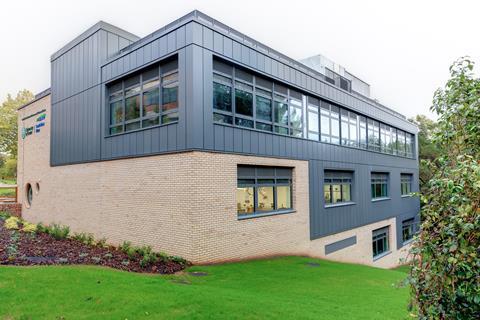
The Centre for Resilience Environment, Water and Waste (CREWW) at the University of Exeter is the world’s first purpose-built, net zero water sector research facility.
This £30m, 16,000ft2 building, completed in 2024, focuses on water resilience and climate change research.
AECOM led the multidisciplinary design team, implementing innovative sustainable solutions that reduced the building’s carbon footprint by 36% compared with typical laboratories.
The project overcame pandemic-related challenges and site constraints to deliver a BREEAM Excellent rated facility.
CREWW serves as a beacon for environmental leadership, fostering collaboration between academia and industry to drive advancements in water management and sustainability.
AKT II, Norton Folgate
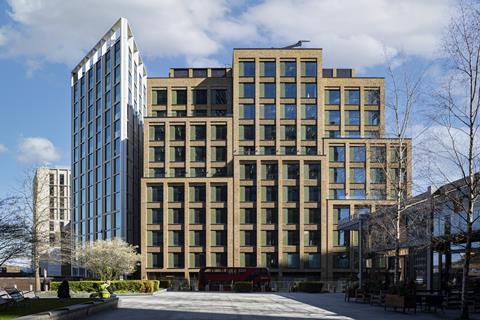
Norton Folgate, a commercial mixed-use project by British Land in London’s Spitalfields, exemplifies sustainable development by integrating Victorian heritage with modern design.
The project, delivered by four architectural practices, prioritised circular economy principles and material reuse. Achieving impressive carbon reductions, it met LETI 2030 targets for upfront carbon and nearly reached RIBA 2025 targets for whole-life embodied carbon.
The development retained 39.3% of existing structures, recycled 99.7% of waste and implemented innovative technologies such as air-source heat pumps. With an all-electric design and locally sourced materials, Norton Folgate demonstrates excellence in low carbon construction and heritage preservation.
Bellway Homes, MiTek UK & Ireland, Zehnder, Barton Quarter - Plot 256 - leading the way towards carbon-cutting construction
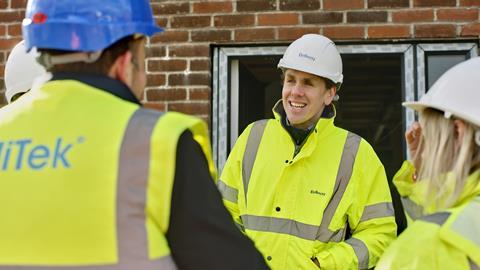
Bellway Homes’ Plot 256 at Barton Quarter showcases pioneering sustainable home construction. This experimental project, designed collaboratively using digital technology, incorporates advanced features like increased cavity widths, air-source heat pumps, underfloor heating and triple-glazed windows.
Achieving an EPC A rating and SAP score of 97, Plot 256 serves as an innovation centre for industry education. The project demonstrates the feasibility of integrating complex sustainable technologies in residential construction, providing a blueprint for future developments.
By combining offsite manufacturing, innovative design, and cutting-edge climate control systems, Bellway Homes is leading the way in efficient, high-quality, low-carbon homebuilding, setting new standards for the UK construction industry.
Join us for the 30th edition of the ��ɫ����TV Awards
This year’s event will take place at the Grosvenor House Hotel on 5 November.
There are 21 categories to enter, so make sure you are in the room for construction’s night of nights and to celebrate excellence.
Tickets are selling fast, so .
Chetwoods Architects and Baytree Logistics Properties, Baytree Nuneaton
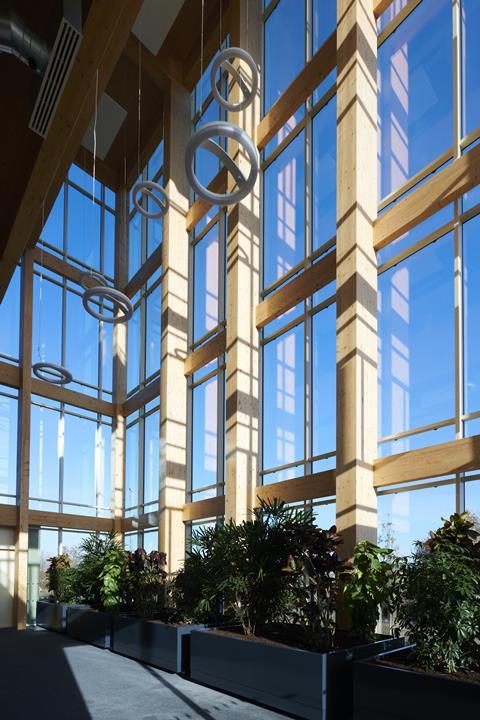
Baytree Nuneaton, completed in November 2023, is a pioneering 1,000,000ft2 industrial and logistics project featuring one of the UK’s largest timber structures.
The development includes a 30,000ft2 three-storey timber office, showcasing innovative sustainable design.
With a focus on carbon reduction, the project achieved a 14,554-tonne CO2e whole-life carbon reduction over 30 years. The timber office alone sequesters 1,000 tonnes of CO2e. The scheme also prioritises community engagement, supporting local initiatives and providing facilities for public use.
This exemplar project sets new standards for sustainability in the industrial sector.
Cundall, Eden, New Bailey
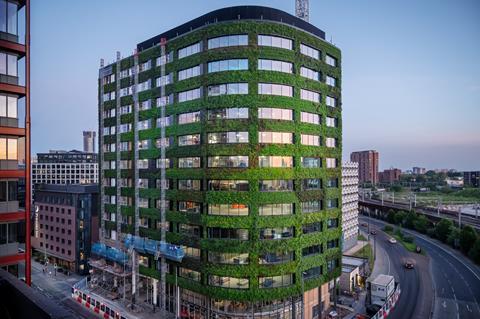
Eden, a £36m office building in Salford, sets a new standard for sustainable architecture in the UK.
Developed by the English Cities Fund, it boasts Europe’s largest living wall and the highest NABERS UK design reviewed target rating for a new-build. With an upfront embodied carbon rate of 634kg CO2/m², Eden significantly outperforms conventional office buildings.
It achieves BREEAM Outstanding, is WELL-enabled, and delivers a 174% net gain in biodiversity. Designed to operate on 100% renewable energy, Eden demonstrates that cutting-edge sustainability can be achieved within commercial constraints, costing just 2% more than standard office buildings.
Davies Maguire, Sheldon Square Amphitheatre
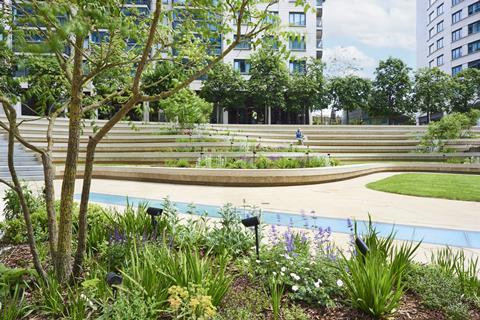
A sustainable urban redevelopment within London’s Paddington Central, showcasing innovative use of earth friendly concrete (EFC®) to reduce embodied carbon. The project demonstrates the power of early stakeholder collaboration and pre-construction trials.
Key features include a 5.5 Star NABERS UK rating, BREEAM Outstanding certification, and an 85% reduction in embodied carbon compared with the initial design concept.
The amphitheatre’s distinctive warm honey-coloured tone and exposed aggregate finish blend with surrounding materials while maintaining its unique character.
This year’s judges
- Yetunde Abdul, director of industry transformation, UKGBC;
- Bola Abisogun, founder, Digital Twin Skills Academy CIC;
- Brian Berry, chief executive, Federation of Master Builders;
- Rachel Bell, director of partnerships, Stride Treglown;
- Anna Clarke, director of policy and public afffairs, Housing Forum;
- Mark Cleverly, partner, CPC;
- Joanne De La Porte, senior sirector - project management, Gleeds;
- Katy Dowding, CEO and president, Skanska UK;
- Karen Gidwani, partner, Fenwick Elliott;
- Kay Hughes, design director, HS2;
- Ellie Jenkins, partner, Akerlof;
- Félicie Krikler, director, Assael;
- Doris Lam, development director, EcoWorld London;
- Liz Male, founder, LMC;
- John Marland, chief development officer, Bruntwood;
- Flan MacNamara, construction director, Sellar;
- Kamran Moazami, executive managing director, property & buildings, WSP;
- Robin Nicholson, fellow, Cullinan Studio;
- Iain Parker, director, T&T Alinea,
- Simon Rawlinson, head of strategic research and insight, Arcadis;
- Mark Robinson, chief executive, Scape Group;
- Veronica Senior, senior manager global captial projects, Lloyd’s;
- Scott Sanderson, partner, PRP;
- Neal Shasore, head of school | CEO, London School of Architecture;
- Trudi Sully, UK & Europe lead - industrialised design & construction, Mott MacDonald
- Lynne Sullivan, chair, National Retrofit Hub;
- Gauri Talathi-Lamb, chief executive, FHP ESS;
- Martha Tsigkari, senior partner and head of the applied R+D group, Fosters + Partners,
- Jo Wright, director, Perkins&Will
Greencore Homes, Hook Norton Community Land Trust
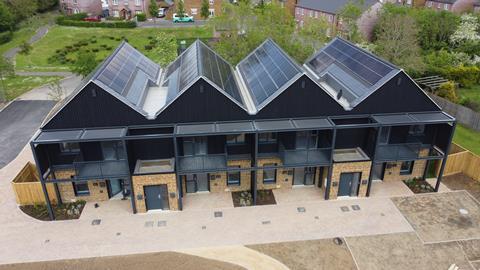
The Hook Norton project in Oxfordshire showcases 12 ultra-low-energy, net zero carbon homes built through collaboration between Greencore Homes, Hook Norton Community Land Trust, Charlie Luxton Design, SNRG and Soha Housing.
The climate-positive homes feature closed timber-frame panels insulated with natural materials, meeting Passive House Institute’s low-energy building standards. A microgrid solution optimises energy usage from solar panels.
The project prioritises affordability, sustainability and community engagement through innovative financing and design. With a mix of affordable rental and shared-ownership units, the development aims to provide low carbon, healthy living for local people while serving as a model for sustainable residential projects.
Quadrum Global, 11 Belgrave Road
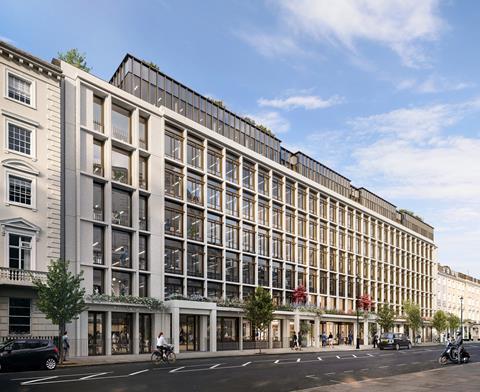
This pioneering net zero office building in Victoria, London, transformed a 1950s structure into a 150,000ft2 sustainable workplace.
The £135m redevelopment achieves net zero carbon in design, construction and operation, with a NABERS UK 5.5 target rating and BREEAM Outstanding certification. The project retains part of the existing structure and incorporates innovative materials and technologies.
Features include 109,000ft2 of grade A office space, 14,000ft2 of amenities and 13,000ft2 of green space, setting new standards for sustainable urban development.
Thornton Tomasetti, 40 Charter Street
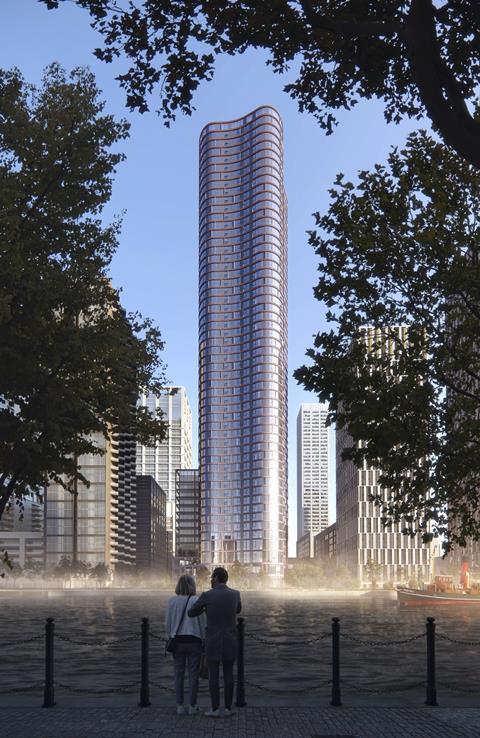
A low-carbon residential structure by Canary Wharf Group, setting new industry standards for sustainable construction.
The project showcases innovative approaches to reducing embodied carbon, including optimised structural design, seasonal concrete mixes and real-time carbon tracking during construction.
The team achieved significant carbon reductions while maintaining construction efficiency, with embodied carbon consumption of 200-250kg CO2e/m3, outperforming Greater London Authority baselines.
This collaborative approach provides valuable insights for future low carbon construction projects and demonstrates the practicality of sustainable building practices.
Tilbury Douglas, St. Mary’s Catholic Voluntary Academy
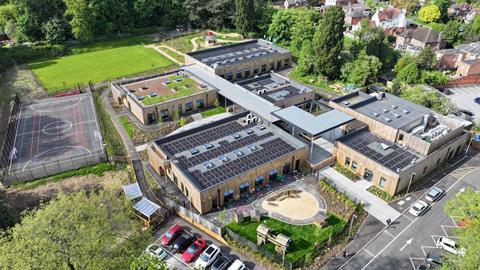
St Mary’s Catholic Voluntary Academy in Derby is a pioneering GenZero pilot school for the Department for Education.
Rebuilt after an arson attack, the school embraces net zero carbon operation, low embodied carbon and modern methods of construction. It features biophilic design principles, innovative sustainability measures and a timber frame construction.
The project was completed within 11 months and a £14.5m budget. As a trailblazer, it will inform future educational briefs and low carbon design through a research programme with the University of Derby, potentially impacting generations of school designs.

























